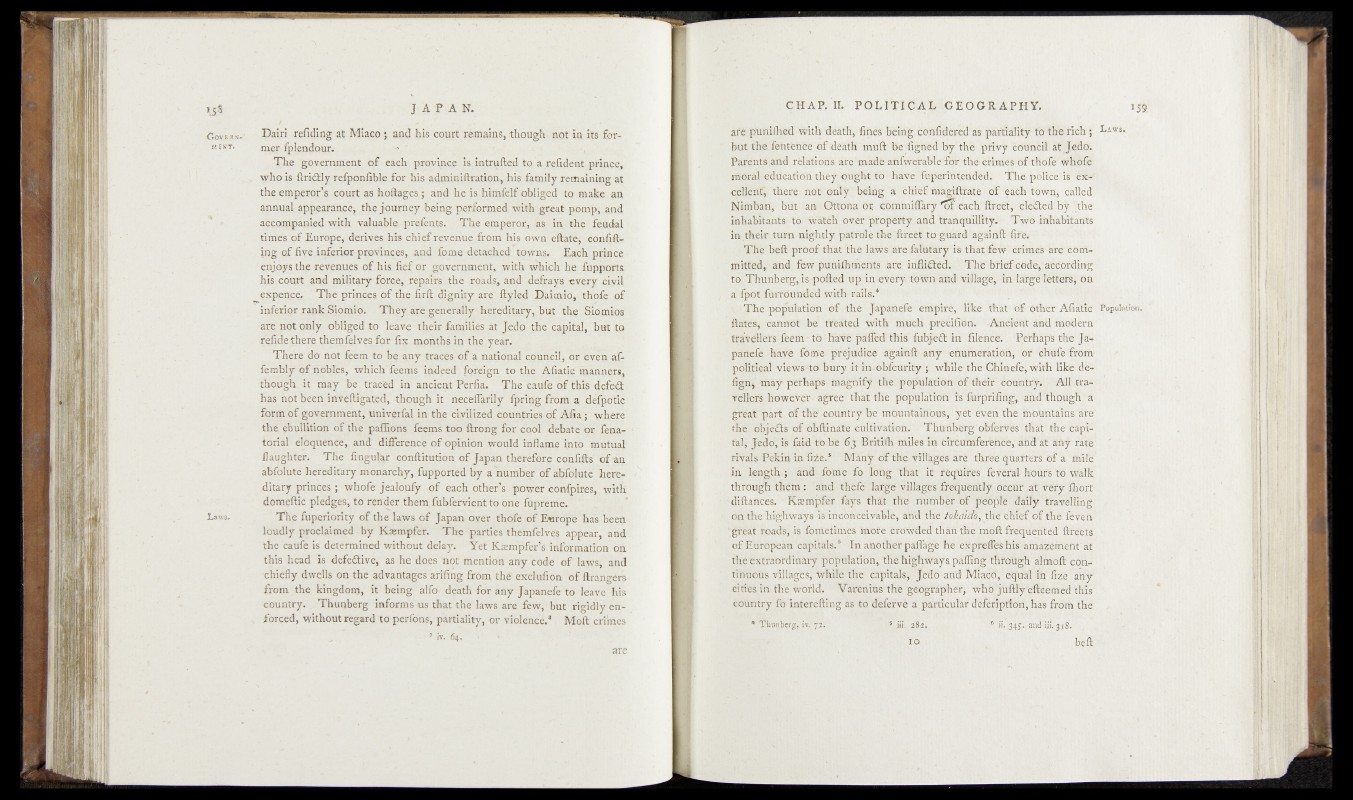
pair! refiding at Miaco; and his court remains, though not in its'former
fplendour. •-» '
Tfip *government of each, province isintrqfted fo a refident prince,
who is ftri&Ly refponfiblefor his adminiftration, his family remaining at
the emperor’s cpurt as hoftages; and he is hirafelf obliged to make an
annual appearance, the journey being performed with great pomp, and
accompanied with valuableprefents. The emperor, as ip, t the feudal
times of Europe, derives his chief revenue from his own eftatey eonfiflr
ing of five inferior provinces, and fome detached towns. Each prince -
enjoys the revenues of his fief or government, with which he fdpports
his comt and military forse,- repairs the ^oads, and defrays ’every' eiyli
expence, The princes of the firft dignity are' ftyled Daimio, tfiofe of
inferior rank Siomip. They are generally hereditary, but the Sfomios'
are; not only obliged to leave tjieir fenaifies at Jedo the capital, but to
refide there themfelves for fix months in the' year.
There do not feem to b? any traces of a national council, or'even af-
fembly of nobles, which feems indeed foreign to ^ e Afiatic manners,
though it may be graced in ancient Perfia. The caufe of this defe$
has npt been inveftigated, though it neceffarily fprihg from a defpoti?
form of government, univeifal in the civilized countries of Alia; where
the ebullition of the pafiions feems too ftrong for’caoT 'debate or, fena-
torial eloquence, and difference of opinion would inflame into |S|tua|
flaugfiter. The fingul^r conftitution, of Japan therefore confifts' of an
abfolute hereditary monarchy, fupported by a'number of abfolute hereditary
princes j whofe jealpufy of each other’s -power confpires, with
domeftic pledges, to render them fubferviept tp one fupreme.
The fuperiority of the laws of Japan- over thofe of Europe has been
loudly proclaimed by Kasmpfer. The parties themfelves appear, and
the caufe. is determined without delay. Yet Kaempfer’s information on
this head is defective, as he does not mention any code of lawsj and
chiefly dwells on the advantages arifing from the exclufion of ftrangers
from the kingdom, it being alfo death for any Japanefe to leave his
country. Thunberg informs us that the laws are few,'but rigidly enforced,
without regard to perfons, partiality, or violence/ Mod crimes
y i l ; r ■ j P 4 >v. 64.
afe.-ftoiflied with-déâffi? fihès being confideredâs partiality tö the rich ; Laws.,
but thé fehtênce of tdiSaîîL muft Hçrfi'ghBd’by thè jitivy ècfflftcfl Sf Jedo.
Parents and rél'atiôiis àfe -màd’ë'ânfwefabîe for fhl&tflisnlëèïtif tHofe'whèfe
rffêr âi:éd ueattdut„ The pMnlsfris 'èxcëljénSt'thferè
' being a -chief ftfagiflfàte,?^ï''Y&cb to^rn, càllëa ' /
Nimban, but ah • Gïtöna 01; cbmfnHïary *or each‘'ft'Teét,l,;ïel:éb:Pd’b’^ ^ h è ï '
inhabitants to WUteh avè'r jÿrbpérty 'and traAquilMy. Twó inhab&tahts
imtheiu turn nightly patrolèthe'fêfë'éjptogBarâ'agâirvft fifë.
The beffi-pröof that'the laws,'arefafotarv is tkât-few''crimes4re'‘éöm-
mifetea^ and fèw punifoments:’4tfe infliftéd. -The briéfcodte,’ ateCot’ding
to-Thunbeggjti^pofted up in evêry. tebra and ^mag^^H-^sS'gé letters} on
a-fpoifurró’uhded with fâïîs.4 -i
! The pophkition é f thè Japanefé empiré,'föke 'thât of (-ithef AfMtlc ’ Poputet
flàtès,-PahUöt ' be. treated with much pfécifión. -Ancrent ahffmbtlërh '
travellers feèm-to'halve paffed thi-S fubjeft in ■ fileficp. '- ^eÆaps the Japanefe
hâVe fome prejudice againft any efiu’riie'râtrônî “'or chufe froth
p^itieal views-tttf bury it in obfeurity j .while die Q ^ $ §V rith like de-'
fighji îhày pérhaps-'fo'agfê$fjrthe population“ of théhr country Ah-travellers
howëvë’r- agrée that tflë popülatrôfr TS^ f ü r pŸi f f n ^ , , "dr
great part ©f thé' coUntr'y be, tfiduntasSbifé/ yéf <eVèn thè mountSnCdlé'
the*' objeâs of “abftmate cultiVattoh. Thüiibërg ohfer^Bs -tflat théfeap'-^
talj Jedo, is faid to be 63 Britifh fniles in 'tfrcumferfehc'e-, atiS'àt k h f t& è' ^
rivals Pekin ifi fîiè / ÏCÎâhÿ 01'the Ttillagës Sfè tnreè^Haf'terâ'‘df “a 'milh
in length ; and fome fo Jóftg that it rêqiïiffes feyèfai Koèfs tó/ Walk
thfÖUgu thettl : àhd thê'fe lafgfe villages nfëqüéAïly âccur at' vëfy ïhort
diftânc?ês.' Kàempfâ 'fkys thïft fne nufnbët'bf p%Bpië' dàify fra%eU,r^r* -
on the highway's is inconceivable, and the rbfeidfe', the chief óf theféveh '
“gréât toads, ié fórdetitnes rdote Crowdedtba'n'tKe'iqbjft feéqifèrited ftrëèts s
of European capitals.6 In another'pafl'agé he êxpreffés-his amazéfnent at
the extraordinary population, thé highways paffing through almoft conr
tinuous villages, while the capitals, Jedo and Miaco, equal in fize ïny'
cities in the world. Varenius the geographer, who juftly éfteemed this -
coüntry fo 'interefting as to défervé a particular defciiptlon, has from the ,■
4 Tlinnberg, iv. 72. s iii 28.2. 6 ii- 345. and üj. 318.
10 ■ I